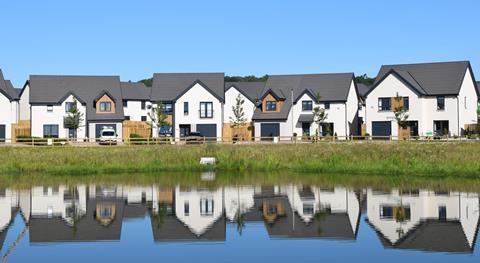Scottish housebuilder makes £3m of cost savings but hails encouraging ‘green shoots’
Pre-tax profit at listed Scottish housebuilder Springfield fell by 5% in the first half of its financial year despite soaring turnover as it weathered rising construction costs and reduced buyer confidence.
The housebuilder, which recorded turnover growth of 85% in the six months to November 30 on the back of major acquisitions in 2021, said its pre-tax profit had nevertheless slipped to £5.9m, from £6.2m the previous year.

Springfield reported total revenue of £162m, up from £87.3m in 2021, with private housing turnover soaring by 151% to £119m. It built 673 homes, its highest ever half year figure, up from 459 in the same period in 2021.
However, the housebuilder, which issued a profit warning in December in the face of the increasingly challenging market conditions, said margins had been impacted both by rising costs and the decision of the Scottish government to cap private rents, which had caused it to pause its planned expansion into the build to rent sector.
Its gross margin fell from 18.5% in the prior year to 14% in the latest six month period.
Last year Springfield also decided to stop taking on new affordable housing contracts in the wake of rising build costs, which saw its affordable housing turnover for the period drop 12% to £28m despite the expanding size of the business overall.
>> See also Top 50 Housebuilders 2022: full table
>> See also Top 50 Housebuilders 2022: in-depth analysis
The firm today said it had responded to the market conditions by making “annualised cost savings of approximately £3m” in the business by reducing its “fixed cost base”, though it did not detail where savings were being made and whether that included redundancies.
The business added in its statement that it has also reduced land-buying activity and was “approaching new site openings with caution”, given “reduced homebuyer confidence resulting from rising mortgage rates and cost-of-living challenges, which peaked around the time of the UK Government’s mini-budget”.
Innes Smith, chief executive officer of Springfield said it had been a “challenging period” for the housebuilding industry which had faced “significant headwinds”. “The UK government’s mini-budget in September reduced the confidence of homebuyers and the cost of mortgages increased significantly,” he said. “Our affordable housing business was greatly impacted by build cost inflation and, with the Scottish Government still to review its affordable housing investment benchmark, it is not currently possible to continue building affordable homes at the same pace as we have in the past.
“Plus, while one land sale to a housebuilder was achieved, the industry-wide stalling of land purchases meant that we could not secure acceptable value for additional sales.
However, he said he was encouraged by signs that market conditions were “improving”. “While it is too early to call a recovery, the green shoots we are experiencing and which are being seen across the industry, through increased reservations and visitor levels, are encouraging.
He added that the “foundations” of Springfield remained strong and the business was focused on reducing its £74m net debt position. Springfield built up debt with the purchases of Mactaggart & Mickel and Tulloch Homes in 2021.
Shares in the firm fell more than 10% on opening this morning before recovering some of their ground.











No comments yet